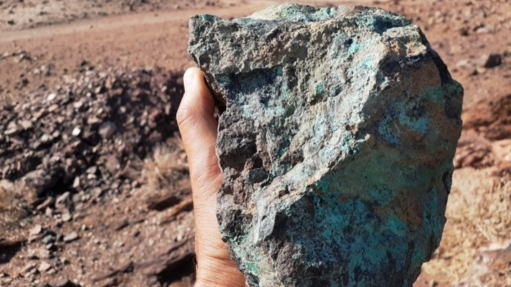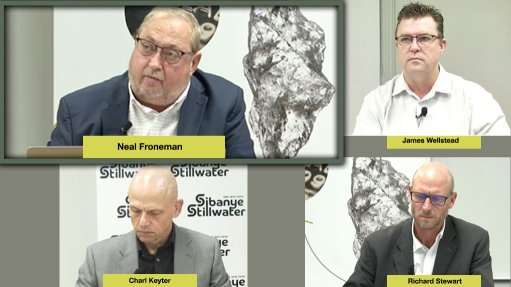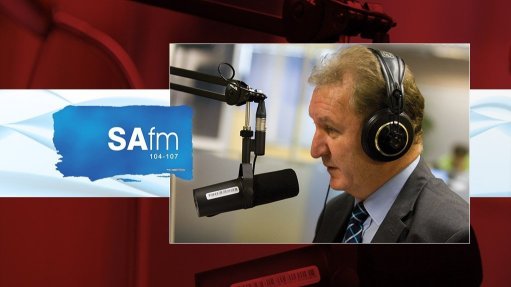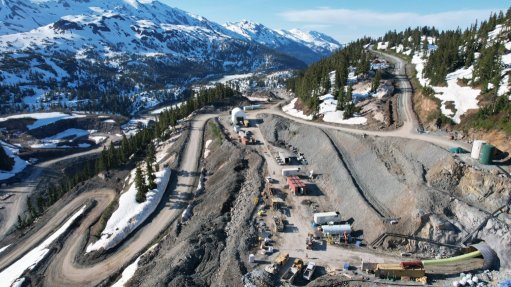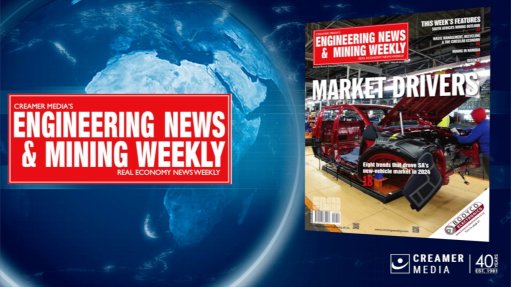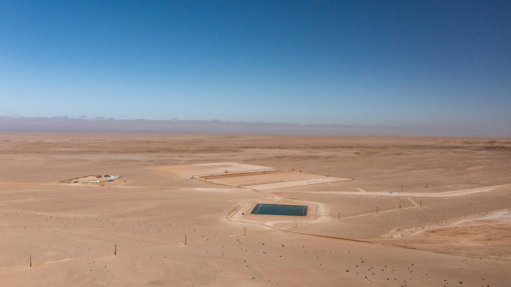Amplats trials BME’s portable emulsion system at Tumela

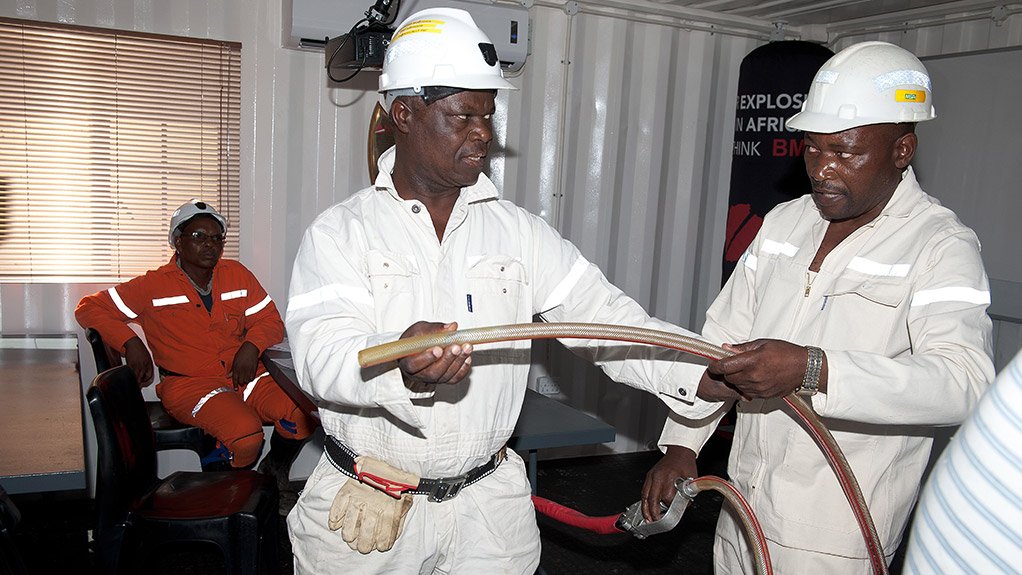
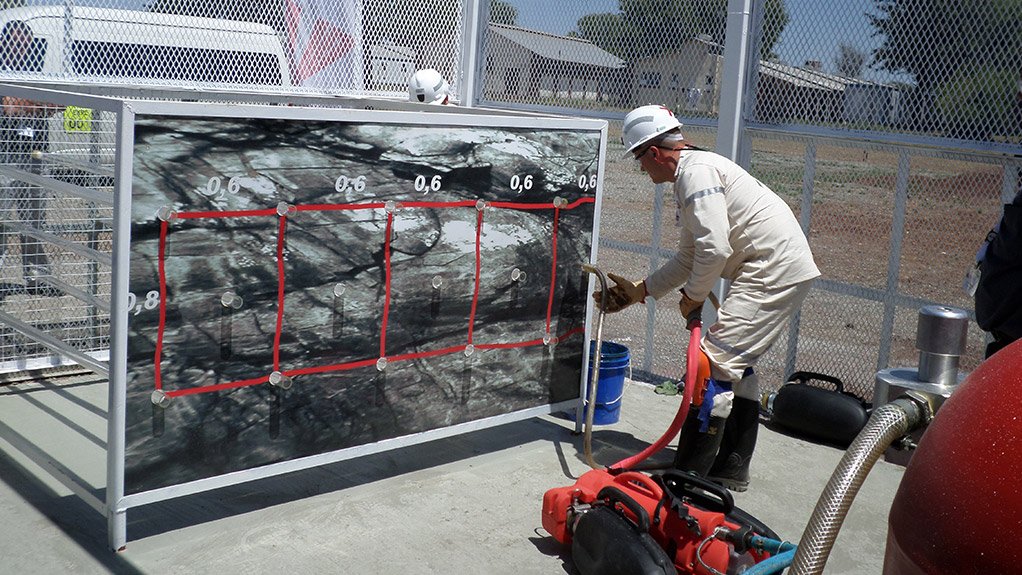
TRIAL AND ERROR BME will roll out 54 portable charging units and train the shaft’s 180 underground personnel on how to use the new equipment during the four-month trial period
SAFETY ENHANCER Emulsions become explosive only when sensitisers are added immediately before blasting is undertaken
Explosives company BME is supporting platinum miner Anglo American Platinum’s (Amplats’) efforts to improve and modernise its operations through the introduction of a new portable emulsion system at the miner’s Tumela underground operation in Thabazimbi, Limpopo.
BME officially opened its first narrow-reef emulsion site and training centre at Tumela, where Amplats is trialling the system at the 16 West shaft, earlier this month.
The company will roll out 54 portable charging units (PCUs) and train the shaft’s 180 underground personnel in the use of the new equipment during the four-month trial period.
“We aim to drill 12% fewer holes using this technology, saving us time at the rock face,” said Tumela production manager Pierre Prinsloo at the opening of the facilities.
He also highlighted that the emulsions were safer to transport than traditional explosives because the emulsions became explosive only when sensitisers were added immediately before loading the blast face.
“We also expect to not only use fewer explosives and transport cars underground but also consume fewer drill steels, and to have more flexibility with our shaft infrastructure.”
Further, Prinsloo said some of the shaft’s crews had already recorded “significantly improved” advance rates per blast.
He noted that the testing process, to date, had included engagement with the union leadership, underground crews and employees to ensure that all stakeholders were involved in establishing the value of any new interventions undertaken by Tumela.
During the event,BME senior operations manager Selwyn Pearton added that the explosive characteristics of pumpable emulsions and the improved transmission of energy to the rock mass surrounding the blast hole led to more efficient blasting.
He also noted that the emulsions were classified as UN Class 5.1 oxidisers and were, therefore, subject to fewer legal restrictions when being transported and stored.
“This classification is due to the inability of the emulsion to detonate prior to the addition of sensitising agents during the loading of blastholes at the face.”
Further, Pearton explained that BME’s PCU was developed over the past seven years to “transfer the benefits of emulsion explosives to the underground, narrow-reef environment”.
“The improved safety and efficiency in blast performance has made emulsions the predominant explosives medium being used in opencast mining.”
Pearton, who led the development of the PCU, highlighted that one of the breakthroughs achieved in the evolution of the unit had been its compact, lightweight and robust design.
“The PCU weighs just 14 kg and the pump component is carried separately in multiple 20 kg emulsion bags. The sensitiser tank is also in a separate container, which is latched onto the pump just before charging and renders the emulsion ready for blasting as it enters the blast hole,” he stated.
The unit’s closed emulsion system prevents emulsion contamination and waste through the use of sealed emulsion bags and dedicated bag-filling stations, located underground close to the work face, Pearton said. He added that the emulsions were transferred to the stations in cassettes – loaded with the emulsions from BME’s above-ground facilities.
Further, the simplicity of the PCU’s design and operation procedures allowed for training to be conducted “cost effectively and relatively quickly”, Pearton added, with the training facilities having included a mock-up blasting rig to ensure training reflected real-life experience.
“The quality of BME’s emulsion is another vital element of the process, as it can be pumped several times without causing any product degradation. It can also be stored for extended periods [without] the quality of the product being reduced.”
Pearton highlighted that, to improve efficiencies and reduce downtime underground, units could easily be exchanged and replaced with the spares stores underground.
“Radio frequency identification technology is also in use on the pumping units to ensure their location is tracked at all times,” he added.
BME GM South Africa Albie Visser remarked during the opening that BME’s on-site resources included an office complex, a PCU workshop, a training centre and spares stores to support operations.
“We have 12 staff on site to ensure a smooth roll-out, including managers, administrators, maintenance technicians and training practitioners,” he said.
In conclusion, Prinsloo said that Amplats would make a final decision on whether to continue using the technology in the next six months.
Comments
Press Office
Announcements
What's On
Subscribe to improve your user experience...
Option 1 (equivalent of R125 a month):
Receive a weekly copy of Creamer Media's Engineering News & Mining Weekly magazine
(print copy for those in South Africa and e-magazine for those outside of South Africa)
Receive daily email newsletters
Access to full search results
Access archive of magazine back copies
Access to Projects in Progress
Access to ONE Research Report of your choice in PDF format
Option 2 (equivalent of R375 a month):
All benefits from Option 1
PLUS
Access to Creamer Media's Research Channel Africa for ALL Research Reports, in PDF format, on various industrial and mining sectors
including Electricity; Water; Energy Transition; Hydrogen; Roads, Rail and Ports; Coal; Gold; Platinum; Battery Metals; etc.
Already a subscriber?
Forgotten your password?
Receive weekly copy of Creamer Media's Engineering News & Mining Weekly magazine (print copy for those in South Africa and e-magazine for those outside of South Africa)
➕
Recieve daily email newsletters
➕
Access to full search results
➕
Access archive of magazine back copies
➕
Access to Projects in Progress
➕
Access to ONE Research Report of your choice in PDF format
RESEARCH CHANNEL AFRICA
R4500 (equivalent of R375 a month)
SUBSCRIBEAll benefits from Option 1
➕
Access to Creamer Media's Research Channel Africa for ALL Research Reports on various industrial and mining sectors, in PDF format, including on:
Electricity
➕
Water
➕
Energy Transition
➕
Hydrogen
➕
Roads, Rail and Ports
➕
Coal
➕
Gold
➕
Platinum
➕
Battery Metals
➕
etc.
Receive all benefits from Option 1 or Option 2 delivered to numerous people at your company
➕
Multiple User names and Passwords for simultaneous log-ins
➕
Intranet integration access to all in your organisation









